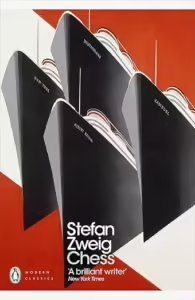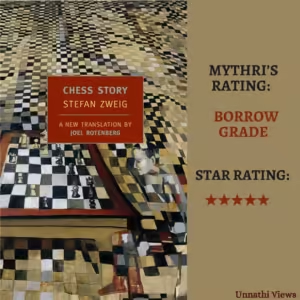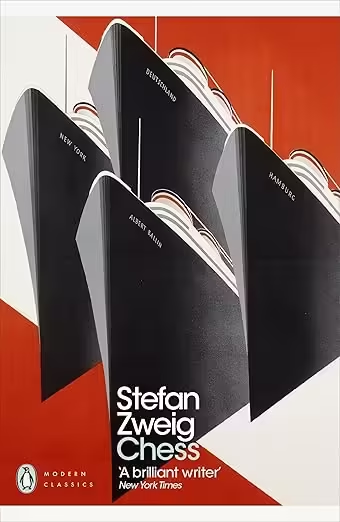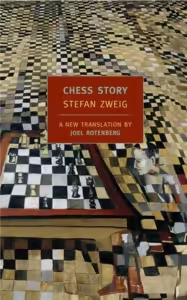Namo Namaha, bibliophiles!
Can the very thing that saves your mind end up breaking it? In Chess Story, Stefan Zweig takes you into a world where a simple board game becomes both salvation and torment.

Affiliate Link (India)
This psychological drama unfolds aboard an ocean liner, where chess champion Mirko Czentovic’s exhibition match transforms into something far more intense when he faces Dr. B., an Austrian lawyer with a dark past!
What begins as a casual game evolves into a gripping tale of survival, where chess becomes entangled with Nazi imprisonment trauma and the desperate measures one takes to preserve sanity in isolation.
The story’s impact is heightened by Zweig‘s choice of narration. Through the eyes of an unnamed passenger-observer, you’ll witness events unfold with documentary-like precision, allowing the darker themes to surface gradually and powerfully. As Zweig himself describes chess in the story:
The Book at a Glance
Stefan Zweig wrote this novella in 1942 during his exile in Brazil, shortly before his death. Originally written in German as Schachnovelle, the story reached English readers through Anthea Bell’s translation, which captures the intense psychological drama of the original text. At just 84 pages, this compact yet powerful work punches far above its weight in both insight and impact.
- Title: Chess Story (also published as The Royal Game)
- Original Title: Schachnovelle
- Author: Stefan Zweig
- Translator: Anthea Bell
- Publisher: Penguin Books
- Publication Year: 1943 (German), 2006 (Penguin Red Classic)
- Genre: Psychological Fiction, Holocaust Literature
- Setting: A passenger liner traveling from New York to Buenos Aires
Why Should You Read This Book?
Here’s what you’ll discover in this Chess Story:
- A unique perspective on survival during the Holocaust
- An exploration of how the human mind adapts under extreme circumstances
- A fascinating study of contrasting forms of genius
- Insights into the power of intellectual pursuit as both shield and sword
- A thought-provoking look at the nature of obsession and resilience
As you read, you’ll meet three remarkable characters who bring this story to life.
Your guide is an observant narrator who takes you through a psychological drama featuring two extraordinary minds.
First, there’s Dr. B., whose relationship with chess emerges from unimaginable circumstances. As he reveals,
Then there’s Mirko Czentovic, the world champion whose genius exists in isolation. The narrator notes of him:
The psychological intensity of the story is captured perfectly when Dr. B. describes his isolation:
Through Dr. B.’s story, you’ll discover how chess becomes a weapon against oppression. The contrasting minds of the two players raise haunting questions about the nature and cost of genius.
Content Warnings
Before you begin, you should know the story contains:
- Psychological torture and manipulation
- Mental breakdown descriptions
- Holocaust-related trauma
- Prolonged isolation
Review, Recommendation, and Rating
 Mythri’s Rating: Borrow Grade – This book is definitely a one-time must read.
Mythri’s Rating: Borrow Grade – This book is definitely a one-time must read.
(Click the link to learn more about my personal rating system!)
Star Rating: ⭐⭐⭐⭐⭐
This novella will especially resonate if you’re:
- Interested in Holocaust literature
- Fascinated by psychological studies
- A chess enthusiast
- Intrigued by the nature of genius and survival
Why Borrow Grade? Despite its excellence, the intense psychological focus and chess-centric narrative might not appeal to everyone. However, if you connect with any of the themes above, you’ll find a profound reading experience in just 84 pages.
Final Thoughts
As the story demonstrates, even intellectual pursuits can become dangerous obsessions.
In Dr. B.’s haunting words:
Chess Story shows you how the human mind can turn a simple board game into a tool for survival—and how the same tool can become a double-edged sword. It reminds you that genius can manifest in different ways: some are born with it in narrow channels, while others might discover it under the most desperate circumstances.
This haunting tale makes you wonder about your own relationship with the things that help you cope. Has a skill or hobby ever helped you through a difficult time? I’m always interested in hearing about what activities bring you peace and clarity in today’s busy world. Do share your experiences in the comments below. Om Shanti! 🙏
Error: Contact form not found.





